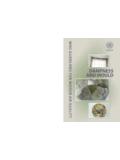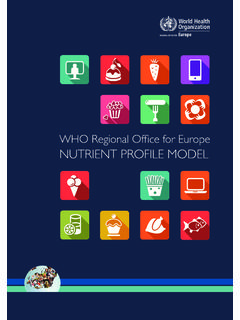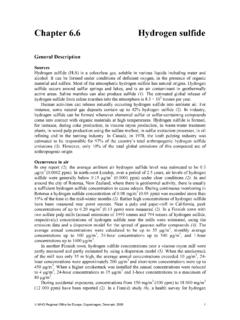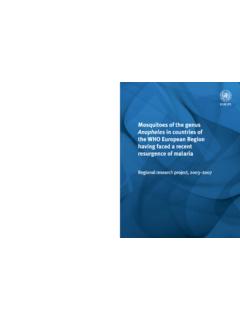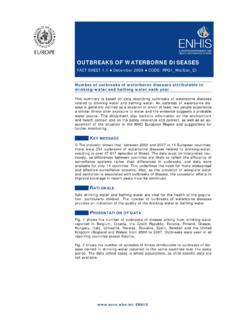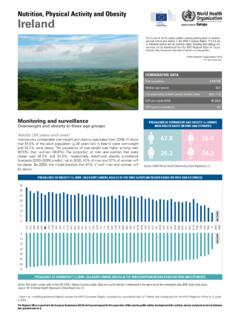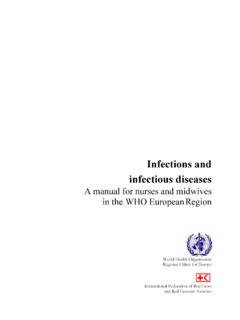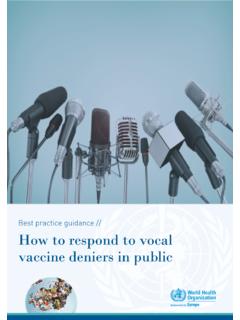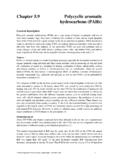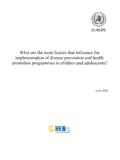Transcription of Good practices in nursing and midwifery - WHO/Europe
1 The WHO Regional Office for Europe The World Health Organization (WHO) is a specialized agency of the United Nations created in 1948 with the primary responsibility for international health matters and public health. The WHO Regional Office for Europe is one of six regional offices throughout the world, each with its own programme geared to the particular health conditions of the countries it serves. Member States Albania Andorra Armenia Austria Azerbaijan Belarus Belgium Bosnia and Herzegovina Bulgaria Croatia Cyprus Czech Republic Denmark Estonia Finland France Georgia Germany Greece Hungary Iceland Ireland Israel Italy Kazakhstan Kyrgyzstan Latvia Lithuania Luxembourg Malta Monaco Montenegro Netherlands Norway Poland Portugal Republic of Moldova Romania Russian Federation San Marino Serbia Slovakia Slovenia Spain Sweden Switzerland Tajikistan The former Yugoslav Republic of Macedonia Turkey Turkmenistan Ukraine United Kingdom Uzbekistan World Health Organization Regional Office for Europe UN City, Marmorvej 51, DK-2100 Copenhagen , Denmark Tel.
2 : +45 45 33 70 00 Fax: +45 45 33 70 01 Email: Website: good practices in nursing and midwifery from expert to expert A manual for creating country case studies good practices in nursing and midwifery from expert to expert A manual for creating country case studies Address requests about publications of the WHO Regional Office for Europe to: Publications WHO Regional Office for Europe UN City, Marmorvej 51 DK-2100 Copenhagen , Denmark Alternatively, complete an online request form for documentation, health information, or for permission to quote or translate, on the Regional Office web site ( ). World Health Organization 2013 All rights reserved. The Regional Office for Europe of the World Health Organization welcomes requests for permission to reproduce or translate its publications, in part or in full. The designations employed and the presentation of the material in this publication do not imply the expression of any opinion whatsoever on the part of the World Health Organization concerning the legal status of any country, territory, city or area or of its authorities, or concerning the delimitation of its frontiers or boundaries.
3 Dotted lines on maps represent approximate border lines for which there may not yet be full agreement. The mention of specific companies or of certain manufacturers products does not imply that they are endorsed or recommended by the World Health Organization in preference to others of a similar nature that are not mentioned. Errors and omissions excepted, the names of proprietary products are distinguished by initial capital letters. All reasonable precautions have been taken by the World Health Organization to verify the information contained in this publication. However, the published material is being distributed without warranty of any kind, either express or implied. The responsibility for the interpretation and use of the material lies with the reader. In no event shall the World Health Organization be liable for damages arising from its use.
4 The views expressed by authors, editors, or expert groups do not necessarily represent the decisions or the stated policy of the World Health Organization. Images: Petr Yancheuski CONTENTS Page Introduction .. 1 Aim .. 2 Purpose .. 2 Template guidelines .. 4 Creating case studies .. 4 Submitting case studies .. 7 Selection process .. 7 References .. 7 Annex 1. Country case study template .. 9 Annex 2. Sample country case studies .. 10 Finland .. 10 Iceland .. 13 Ireland .. 15 United Kingdom .. 18 good practices in nursing and midwifery from expert to expert page 1 Introduction Demographic trends and patterns of diseases have changed significantly over the last years. Meanwhile, new developments in diagnostic technologies and non-invasive treatments have allowed new means of health service delivery and health care models. In order to manage the trends, the World Health Organization (WHO) Regional Committee for Europe adopted Health 2020 (1), which sets the goal: To significantly improve health and well-being of populations, to reduce health inequities and to ensure sustainable people-centred health systems (2).
5 In order to deliver on the goal, Member States of the WHO European Region are now faced with the challenge of providing equal access to health services and improving the quality of services given limited financial and human resources. Nurses and midwives, the largest health workforce of the Region and one that works closely with patients, are central to the efforts to deliver on the priorities of Health 2020. In the Munich Declaration (3) endorsed by ministers of health of the Region in 2000, Member States recognized nurses and midwives as a real force for public health and effective contributors to health systems. However, in order to realize their potential it is vital that nurses and midwives develop and enhance their roles to meet the challenge. The 2002 2008 Strategic directions for strengthening nursing and midwifery services (4) and the more recently updated Strategic directions for strengthening nursing and midwifery services for 2011 2015 (5) seek to provide policy-makers, practitioners and other stakeholders at every level with a flexible framework for broad-based, collaborative action to enhance the capacity of nurses and midwives.
6 Building on the global strategic directions, the WHO Regional Office for Europe has prepared the Strengthening nursing and midwifery services: European strategic directions towards Health 2020 (6). The shared goal is to strengthen the contribution of nursing and midwifery in improving the health and well-being of populations and reducing health inequalities. In many Member States, much work has been done in the development of nursing and midwifery education and enhanced professional roles, including the development of nurse and midwife-led services. This has enabled the management of more complex patient care. There still exists, however, large variation between countries and also little documentation of the ways in which nurses and midwives in the Region have changed their roles and expanded services in order to respond to health changes (7). An evidence-based approach to treatment and care is crucial for the development of nursing and midwifery practice and is important to ensure effectiveness, efficiency and equity of care (8).
7 It is recognized that achieving better health outcomes requires substantially strengthening nursing and midwifery . For this reason, the Regional Office has decided to profile country case studies of good practices in nursing and midwifery . WE BELIEVE that nurses and midwives have key and increasingly important roles to play in society s efforts to tackle the public health challenges of our time, as well as in ensuring the provision of high quality, accessible, equitable, efficient and sensitive health services which ensure continuity of care and address people s rights and changing needs. Munich Declaration, 2000 (3) good practices in nursing and midwifery from expert to expert page 2 Aim The aim of this manual is to gather evidence from Member States on good nursing and midwifery practices and act as a supporting document to Strengthening nursing and midwifery services: European strategic directions towards Health 2020 (6).
8 For this purpose a template is provided to guide collection of this information through country case studies . In this manual good practice is defined as practice that has been proven to work well and produce positive results, thereby deserving the status of a recommendation. Country case studies are an excellent way to share experiences in new services and expanded roles. case studies also enable decision-makers to review the benefits of the contribution of nurses and midwives to population health. Above all, country case studies aim to inspire and encourage the development and dissemination of good nursing and midwifery practices . In addition, country case studies can provide technical guidance to individual Member States by identifying ways to improve workforce capacity, professional education, working conditions, health-related regulations and legislation. case studies can also demonstrate to policy-makers how nurses and midwives contribute effectively to patient care and service needs.
9 case studies also demonstrate how nurses provide increased access to care and improve outcomes, while also improving cost-efficiency and continuity of care. Furthermore, new policy recommendations can be formulated on the basis of the evidence gained. Once collected the country case studies will be compiled into a compendium under the guidance of the Regional Office. The compendium should provide a comprehensive summary of case studies collected from all over Europe and from a variety of health care settings. The focus is on reflecting on the role nurses and midwives play in strengthening and revitalizing health care systems. Purpose The current and emergent public health challenges require intersectoral collaboration and a coordinated approach across the multidisciplinary teams of health professionals (1). Nurses and midwives have key and important skills and expertise, which are essential for population health, in addition to ensuring the provision of quality and equitable services.
10 As public health and health system challenges change, so do the roles of nurses and midwives. How have nurses and midwives initiated change? What have been the benefits for the patient outcome? good practice is based on the best available evidence and appraised as a relevant course of action in its operational environment. good practice can be characterized as beneficial for the client, supportive of the client s well being, justifiable, evaluated, effective, efficient, results oriented, subject to modelling and co modification, applicable, transferable, widely distributed and ethically sustainable. National Institute for Health and Welfare in Finland [in Finnish] (9) good practices in nursing and midwifery from expert to expert page 3 Due to the changes in the health system, efforts to scale up, transform and optimize the capacity of nursing and midwifery are more pressing than ever. Revising roles and expanding the scope of practice of nurses and midwives can result in more effective responses to population health needs.
